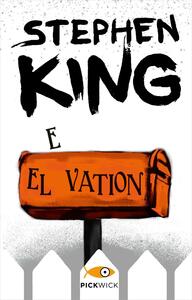Take a photo of a barcode or cover
Narrated by King which wasn't bad.
...with lots of Easter Eggs for the Constant Reader. Enjoyable afternoon read, great character building - typical Stephen Kin :)
Scott Carey doesn't start off the book as a bad guy, but he becomes a better person as his "condition" becomes more and more serious. He is losing weight but not in the way you would think. He is actually becoming weightless, so much so that gravity begins to have no effect on him. However, as this occurs, he is dealing with a quarrel with a woman and her wife. After bringing attention to the fact their dogs are using his lawn to go to the bathroom, he ends up hurting them more than he can understand. These women are being shunned by their conservative town for being lesbians and Scott has only talked to them at this point about their dogs. Therefore, the couple think he is only nitpicking at them for the same reason the other people in Castle Rock decide not to eat at their failing restaurant--because they are lesbians.
Scott eventually becomes close friends with the more hostile of the two women after being humbled and becoming empathetic to their situation. The turning point is after a 10k race in which he helps the woman who dislikes him the most win the race with his weightlessness. The whole scene is beautiful and much more genuine than his other attempts to apologize and they end up having a beautiful friendship. Sadly this cut short once Scott becomes so weightless he decides to float away on a literal blaze of glory but it is a genuinely beautiful ending that results from it. He also inadvertently saves their restaurant and helps the town to accept the women for who they are.
There are other plot points but these ones were the ones that touched me the most.I could not put this book down and even though it is one of the shortest books I read this year, it is definitely one of my favorites.
However, I can't recommend it, because a fundamental aspect of the plot completely turned me off. I'll hide it in a spoiler tag:
Spoiler
The fundamental tension in the story is between a lesbian couple and the hero, a middle-aged, heterosexual white guy who is mysteriously losing all of his weight. The couple has moved into a Trumpy town (as someone who is connected to Castle Rock, I'm so bummed out to learn that it's a Trumpy town) and they own a restaurant that is struggling, because the local Trumpists don't want to spend their money there.Our hero keeps trying to form a friendship with one of the lesbians, who is just kind of a one-note bitch for most of the story, right up until our hero makes a minimal sacrifice that I guess we're supposed to believe is a significant sacrifice, which for some reason inspires the entire Trumpy town to embrace the women and their restaurant.
I was just totally turned off by yet another story where the white man swoops in to save the marginalized people (in this case a married same sex couple) who don't seem to have much agency on their own.
Maybe I'm being too sensitive. Maybe most readers won't be bothered by this, and they will find the story uplifting and joyful, but it just totally fell flat for me, because Scott (our hero) never changes other than the supernatural weight loss, and I really missed that emotional change and growth.
Look, I *love* Stephen King, and it's rare that one of his stories misses the mark for me, but this one missed by a mile.
Scott Carey’s weight is going down, but his body is not changing. Anything that he touches does not affect his weight at all. As Scott comes to terms with that which he cannot change, he attempts to mend fences with his lesbian neighbours, Deirdre and Missy, who have not been welcome in the largely conservative constituency of Castle Rock.
Elevation is the sort of book that you can read in one sitting, and it will reward you for doing so. In producing such a short work, King never feels the need to tell us why this is happening to Scott. He doesn’t need a reason, and maybe the man himself never knows. It lends an air of mystery reminiscent of King’s short stories, which often offer only second acts.
With the weight loss presented as a matter-of-fact occurrence with potentially no resolution, King instead allows us to focus on his secret greatest strength: that of the character study. Scott is far from his first protagonist to close in on later middle-age, and he is basically the prototypical “all around nice guy with room to grow” that you would expect to be thrown into a story like this. With the only thing tethering him to the Earth being his beloved cat and his tennis buddy Doctor Bob, Scott’s a nice enough guy but he needs something more to define him — and so he looks outside.
Like much of King’s best work, The Dark Tower cycle prime among them, Elevation is a story about a group of people coming together and becoming better people through their union. It’s his second ka-tet of 2018, and the more affecting. That Scott tries to gather people around him, only semi-consciously, and that, eventually, they start to respond, provides a thread of inspiration before we can get bogged down too hard in the demographic realities of Castle Rock.
Politically, one wonders why Missy and Deirdre moved to Castle Rock, a distinctly regressive niche in a now purple state. King makes Deirdre standoffish without stooping to “both sides”ism, and his prose is unambiguously supportive of married women to exist (a strange element of prejudice that may surprise non-American readers is the concept that the people of Castle Rock have no problem with lesbians — a dubious proposition — but with married lesbians). This is not about the softening of a hardened woman but of an understanding being attained and an accord being reached.
As Scott carries on, as he lightens his physical and metaphysical loads and considers what he owes to other people, King’s words shimmer across the page. That we never know why this is happening or what is going to happen does not concern us; rather than the crushing inevitability that pervades some of King’s darker work, there is a shocking optimism that belies the group’s fears for Scott’s future. Though we don’t spend a huge amount of time with any of these characters, they are alive on the page and the connections between them are among King’s most genuine work. As we race towards the ending, uncertain to the last, we feel for them and what they will become. Elevation is a giant work of art waiting to explode from the humblest of packages.
Between these slim covers, King offers a work that is at once uplifting and heartbreaking. It speaks to the human capacity to change even as it explores the impermanency of existence. Far from horror, not overtly supernatural, Elevation is one of King’s most humanistic works in a career littered with them. It may be hard for a man in his seventies to manage a full-length novel, a novella, and various Executive Producer roles in a year, but King makes it seem a weightless endeavour. Elevation may seem light, but its themes and its message reverberate loud after the final page is turned.









